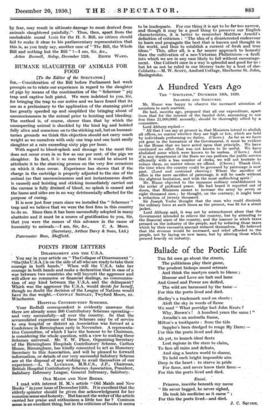POINTS FROM LETTERS
DismraiAmEicr AND THE U.S.A.
. You say in your article on " The Collapse of Disarmament ": !"She [the U.S.A.) is on the side of all who are ready to take their courage in both hands." When will the U.S.A. take her courage in both hands and make a declaration that in case of a war between two countries she will boycott the aggressor and will allow no commerce or financial dealings, no communica- tion of any kind between the _U.S.A. and the delinquent? Which was the aggressor the U.S.A. would decide for herself, though no doubt the decision of the Leagire of Nations would have its due weight.—CONWAY SHIPLEY, Twyford Moors, nr. Winchester.
HOSPITAL CONTRIBUTORY SCHEMES.
Your Redhill correspondent is evidently unaware that there are already some 300 Contributory Schemes operating— and very successfully—all over the country. So that the accumulated experience of these Schemes may be of service to any hospital' or district an Association was formed at a Conference in Birmingham early in November. A representa- tive Coinmittee, of which I have the honour to be Chairman, is considering the whole question; with a-view to making these Schemes, universal.. Mr. T. W. Place, Organizing Secretary of the Birmingham Hospitals Contributory Scheme, Carlton House, Birmingham, has kindly consented to act as Honorary Secretary to this 'Association, and will be pleased to forward information, or details of our very successful Salisbury Scheme are at the disposal of any wishing to avail themselves of our experience.—L, S. LUCKHAM, M.R.C.S., J.P., Chairman, British Hospital Contributory Schemes Association, President, Salisbury Infirmary League, General Infirmary, Salisbury.
OLD MAIDS AND NEW Homo.
, I read, with interest H. M.'s article " Old. Maids and New Books " in your issue of December 13th. It is excellent that the elderly spinster should be given due acknowledgment for her common sense and honesty: But his not the writer of the article 'carried her praise and enthusiasm 'a little too far ? Cominon sense is an excellent thing, but in the criticism of books it seems to be inadequate. For one thing it is apt to be far too narrow, and though it may be a good thing to preserve our English characteristics, it is better to remember Matthew Arnold's definition of criticism : "The idea of a disinterested endeavour to. learn and propagate the best that is known and thought in the world, and thus to establish a current of fresh and true ideas." This, after all, is a far nearer approach to honestS7 than the cultivation of a neo-Victorian Philistinism—a fault into which we are in any case likely to fall without encourage- ment.. One Cobbett once in a way is splendid and good for us : but let us not be ruled in our literary taste by a host of she- Cobbetts.—M. W. Scam, Ansford Cottage, Sherborne St. John, Basingstoke.






































 Previous page
Previous page